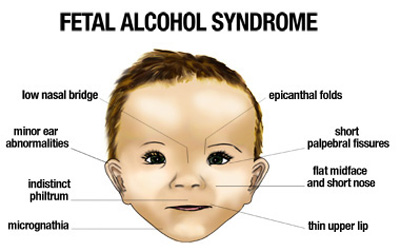Drinking Problem: Fetal Alcohol Spectrum Disorder

Fetal alcohol spectrum disorder is a serious problem among many infants.
When Diane O’Connor adopted four children she had been fostering, she knew she had challenges ahead of her. Her previous experiences with foster children at her home in Upstate Albany had proven such kids often suffered from a variety of emotional and behavioral problems. This was understandable, given the abuse and neglect they had endured in their short lives. O’Connor had experienced past success helping foster children with their issues by using a number of techniques she had learned through foster parent education. But nothing prepared her for what she was about to experience with these children.
O’Connor’s two sons and two daughters, who lived with her since infancy and were officially adopted at the ages of 5 through 6 years, began to show signs of abnormal behavior at a young age. They were extremely impulsive, to the point of having almost no control. They exhibited extreme mood swings, sleep disturbances and developmental delays. They had trouble getting along with other children, and were incapable of playing nicely. They showed extreme frustration in certain situations and did not understand what was being asked of them. Scenes in public were common.
“I couldn’t take any of them to the store without a meltdown,” says O’Connor. “At school, they would take things from other kids not because they wanted and needed them, but just because they were there.”
None of the techniques O’Connor had successfully used on previous foster children worked with these kids, all of whom had the same behavior problems. Although this baffled her at first, she eventually learned the reason.
O’Connor’s adopted children were all suffering from Fetal Alcohol Spectrum Disorder (FASD), a condition that can result when babies are exposed to alcohol while in the womb. Children dealing with this condition, which runs from mild to severe, suffer from varying degrees of brain damage. The most severely affected also have damage to other areas of the body, including the heart and central nervous system.
FASD is widespread, more than people realize. The Centers for Disease Control (CDC) reports that approximately 1.5 in 1,000 children have Fetal Alcohol Syndrome, the most severe condition of the FASD spectrum. Three times that, close to 1 in 200 children, are under the wider FASD umbrella. However, FASD advocates claim that the number is closer to 1 in 100, and many experts believe that the number is actually much higher than that, since so many cases go undiagnosed.
The Spectrum
FASD is one of the most insidious and difficult-to-diagnose conditions affecting children and adults today. In fact, FASD is not a diagnostic term, but developed to be all-inclusive for all spectrums of disabilities that result due to prenatal exposure to alcohol, according to Kathleen Tavenner Mitchell, vice president of the National Organization on Fetal Alcohol Syndrome in Washington, D.C.
“We know today that there is a spectrum of effects associated with prenatal alcohol exposure,” she says. “It results in long-term brain damage.”
A wide variety of behavior issues make up the spectrum of disorders associated with FASD, depending on which part of the fetus’ brain was affected by alcohol. Signs of the condition range from the severe, clinically labeled FAS, to the less obvious that are within the FASD definition. FAS, believed to be the leading cause of mental retardation in the Western world, is usually associated with heavy drinking and includes growth deficiencies, abnormal facial features and brain abnormalities. Milder but devastating nonetheless are other aspects of FASD that manifest themselves in behavior problems and learning disabilities.
But Andrew Adesman, M.D., chief of developmental and behavioral pediatrics at Schneider Children’s Hospital in Lake Success, says women should know that there is “no minimal threshold of safety with alcohol consumption during pregnancy.” There are many variables associated with FAS and FASD that range from age of mother (it’s worse for an older mother), subsequent births (worse for a third child than a firstborn) and, of course, binge-drinking: “Having six drinks in one night is much worse than having one,” says Adesman.
“Bottom line,” he says, “drinking any amount of alcohol during pregnancy is a bad idea. Resist temptation, and reach out to professionals if you need help.”
Children born with FASD can suffer from a slew of issues, including memory problems; inconsistent performance; impulsivity; distractibility; disorganization; difficulty with abstractions, such as math, money management, and time concepts. They also may have cognitive processing deficits; slow auditory pace (they may only understand every third word of a conversation); developmental lags; and the ability to repeat instructions, but an inability to put them into action. One of the most difficult problems many FASD sufferers have is the inability to predict outcomes or understand consequences. They are often diagnosed as autistic, attention deficit disordered or hyperactive.
There are three main problem areas for those with the cluster triad of FASD: nervous system/developmental, interuterine growth and physical features (the distinctive facial abnormalities include thin lips, wide space between lips and nose, small eye openings, and small head size). All three abnormalities are found in children with FAS.
Dr. Adesman warns that some of these symptoms might be present at birth, some might appear when the child is older, and some might come and go.
“Laura” and her husband adopted a 3½-year-old boy in 1990, knowing he had been exposed to alcohol while in the womb. Because he seemed outwardly healthy, she did not realize how affected he was until she began to witness abnormal behavior.
“He was very destructive to our home and belongings. He destroyed TVs, VCRs and many other things,” she said. “He destroyed the walls in his room, the carpet and the lamp. He pulled the closet doors off the tracks, ripped the screen in his window, and threw toys out the hole in the screen.”
FASD can produce other problems in addition to behavioral issues. Many children with the condition suffer from epilepsy. Others have scoliosis, vision and hearing problems.
Not surprisingly, children with FASD have trouble getting through life, especially without early intervention. In most cases, they are not diagnosed with FASD but with a specific disability that is most noticeable. The fortunate ones are given treatment based on their individual problems. This can include therapy for Asperger syndrome, Tourette syndrome and attention deficit hyperactivity disorder (ADHD), as well as specialized teaching. Those who aren’t treated often fall between the cracks and go on to be adults who have extreme difficulty functioning in normal society. Secondary characteristics of FASD—the issues that develop if primary concerns are not addressed—include problems with anger, aggression, anxiety, withdrawal, lying, drug and alcohol abuse, depression and even suicide. Many end up in jail as a result of anti-social behavior.
Dangerous Behavior
Ask most women what they know about alcohol and pregnancy and they will tell you the two don’t mix. So why are so many children born with FASD? Some women are addicted to alcohol and can’t stop drinking even though they are pregnant. Others—the majority—think that having a drink now and then is OK. In reality, nothing could be further from the truth.
The notion that drinking during pregnancy is not a good idea became part of public consciousness in the early 1970s, when researchers at the University of Washington identified FAS. When it was first discovered, the condition was associated with heavy drinking, and seemed to be the consequences of alcoholism during pregnancy. The message was fairly straightforward: Don’t get pregnant if you are addicted to alcohol.
In 1981, the surgeon general issued an official statement on the subject, saying that pregnant women should limit the amount of alcohol they drink. This implied that some alcohol was OK as long as women don’t overdo it.
But in 2005, everything changed. Researchers discovered that even a small amount of alcohol during pregnancy can result in serious problems for the fetus. The surgeon general amended his warning, telling pregnant women and women who may become pregnant to “abstain from alcohol consumption in order to eliminate the chance of giving birth to a baby with any of the harmful effects of the Fetal Alcohol Spectrum Disorders.”
Despite this warning, many women still think it’s fine to indulge every now and then. This is not surprising given the inconsistent information doctors are providing to patients.
“We still have doctors out there advising women that it’s OK to drink during pregnancy,” said Mitchell. “The result of this misinformation is that 70 percent of the population has been exposed to some level of alcohol in utero.”
This shocking statistic is evidence of a vast number of uninformed doctors who clearly don’t know the facts about FASD.
“Both human and animal research has taught us that alcohol can cause significant brain damage to a fetus,” said Mitchell. “A lot of people struggle with mild learning disabilities and other issues, not realizing their problems could be related to alcohol exposure while in the womb.”
One of the difficulties in diagnosing FASD comes from the fact that many women do not want to admit they used alcohol during pregnancy. Often the only women who will acknowledge this behavior are those who have come to terms with a drinking problem.
“Charlene” is one of those women. The effects of alcohol on unborn children were not widely known at the time of her pregnancies in the 1960s, and Charlene drank a lot while she was carrying both her sons.
“I don’t recall drinking during my first pregnancy at age 16, but I may have, because drinking had become part of my life by then,” she said. “I married and was financially limited. I am pretty sure I drank at the very beginning of my second pregnancy before I was aware. I was drinking alcoholically by then.”
Charlene admits that even though her doctors didn’t tell her not to drink during pregnancy, she never would have admitted to the behavior even if they had.
Although neither of her sons were officially diagnosed with FASD, Charlene wonders if the problems they have encountered in their lives are related to her alcohol use during pregnancy.
“I can’t say my kids suffered any outward physical deformities, but they both have a lot of emotional damage,” she said. “My oldest son has been diagnosed with mental illness and my youngest son has anger management problems. I have wondered how much effect my drinking may have contributed to these problems.”
Of course not all women living with children affected by FASD drank during pregnancy. Many have unknowingly adopted kids who suffer from the condition. A large number of children adopted from orphanages in eastern European countries suffer from FASD, where alcohol consumption is much higher than in the United States.
Effects on the Brain
Although much has been made in the media of the effects of drugs like cocaine and heroin on a growing fetus (babies are born addicted to drugs and may have lasting neurological issues), the effects of alcohol on the developing brain have been shown to be much more devastating.
At San Diego State University’s Department of Psychology, researcher Edward P. Riley, Ph.D., is studying the effects of alcohol on the developing embryo and fetus, and the alterations in the normal development of brain and behavior. Riley’s research focuses on these changes.
Initially, researchers learned about the brains of individuals with FAS through autopsy studies, which showed diffuse effects throughout the brain. The autopsies were done on very severely affected children who died at a young age as a result of FAS. But over the last 10 years or so, researchers have gotten a better look at the brains of individuals with the full spectrum of outcomes by using magnetic resonance imaging (MRI).
“What we found was that some brain areas were more sensitive to the effects of prenatal alcohol than others,” says Riley, the brain and alcohol researcher.
Dr. Riley and other researchers have pinpointed certain parts of the brain that seem most susceptible to alcohol. For example, while overall brain size was reduced, the effect was due to a reduction in the parietal and the frontal lobes, areas of the brain that control a variety of functions. The cerebellum, which plays a key role in cognitive function, also appeared to be affected. The corpus callosum, the major fiber tract between the hemispheres of the brain, was also shown to be particularly sensitive to prenatal alcohol.
According to Mitchell, the research that has been done on FASD is reason enough to warn women against having even one drink during pregnancy.
“From the public health perspective, we can’t say one drink now and then is not going to cause harm to the fetus,” she says. “A woman can have the best intentions and think she is just having one drink and it won’t do any harm. But that one drink might actually be three drinks. A Long Island Iced Tea or a large goblet of wine is more than one drink. And in animal studies, all it took was three drinks—considered a binge—to cause damage. Drink alcohol on the wrong day—on the day the face forms, or a certain part of the brain is developing—and you can end up with a baby with FASD.”
Help for Kids
The good news about FASD is that help is available for those suffering from the various problems that result from the condition. As awareness of the dangers of alcohol during pregnancy become greater, public agencies and private organizations are making themselves available to parents dealing with this condition in their kids.
Although New York State does not have an official program for children with FASD, the New York State Office of Alcoholism & Substance Abuse Services (OASAS)recognizes the existence of FASD and tries to help parents dealing with it.
“If a child has certain behavioral, sensory or disability issues, they can get help through different state service providers,” says Margo Singer, FASD New York State coordinator for the OASAS.
The state is also working toward raising awareness of FASD among professionals in the health care field, as well as working to prevent consumption of alcohol during pregnancy.
“Many professionals are not aware of FASD and need to know about resources and services we have available,” says Singer. “We also do a lot of training of staff to help them with early intervention. We are raising awareness at family planning agencies, special education centers, and juvenile detention facilities. We give them strategies they can use with those that have FASD, and information they can use to prevent FASD in childbearing-age women.”
Although children suffering from FASD have tremendous challenges, with the right help, many can live moderately productive lives. O’Connor’s four FASD children are adults now. One has her own apartment close by her mother’s home, while another is in an independent living program. One daughter just graduated from the Marine Corps after having been homeless for a time, and one of O’Connor’s sons recently moved from a psychiatric facility to a residential treatment facility.
“There is never a stop to the treatment,” says O’Connor. “It’s ongoing. It’s just tweaked for the person’s age. I’m just happy they all got their high school diplomas, and are not using drugs or alcohol. I consider that a success.”
source: Long Island Press


